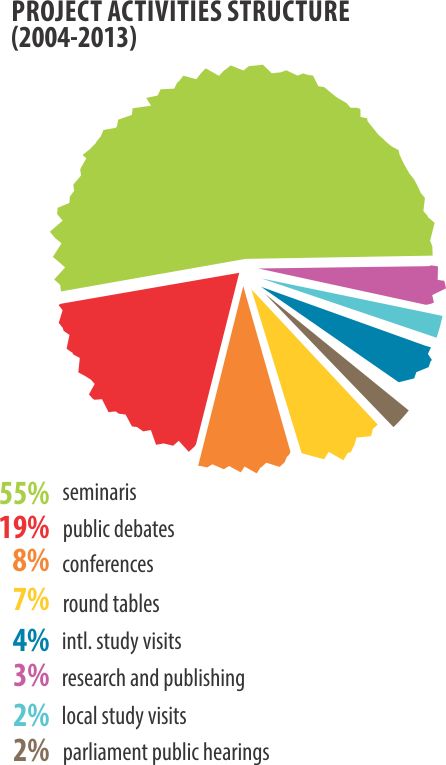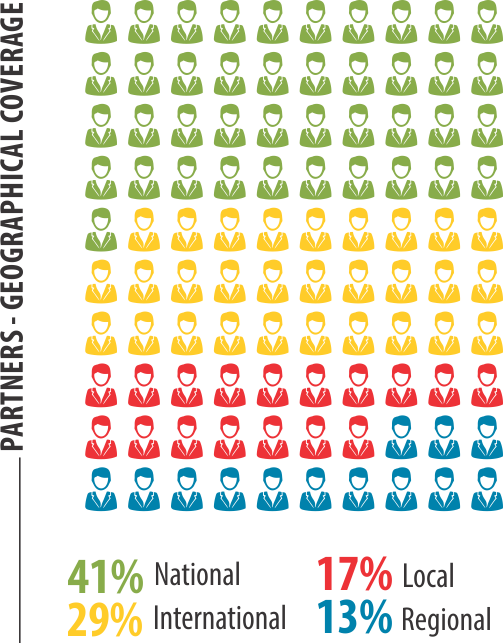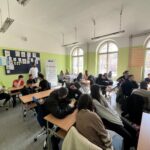We fulfill our major task of helping men and women engaged in public affairs to obtain additional knowledge and mandatory skills primarily by multi-year capacity building programs. These programs are tailor-made to respond to the needs of our participants and the requirements of their roles in society.
Seminars and workshops are attended by participants belonging to various political parties, and often by individuals from very different spheres of public life. They are held under the Chatham House rule in order to achieve more freedom for both participants and lecturers, since without a free flow of ideas and arguments the process of learning is insufficient.
Over the last ten years, these forms have also proved to be genuine confidence building tools. Through learning and debating, participants get to know each other much better and understand that belonging to different political parties does not necessarily make people adversaries.

Simultaneously with local, national and regional seminars and workshops, BFPE organizes numerous policy debates and round tables, national and international conferences, public advocacy activities and book launches.
In 2013 we were invited by a public management research consortium implementing the project COCOPS – Coordinating for Cohesion in the Public Sector of the Future to organize the part about competences of public administration in Serbia. Thus Serbia became part of a comprehensive study that is to be one of the largest comparative public management research pieces in Europe, supported by the European Commission’s FP7 program and coordinated by the Erasmus University in Rotterdam and the Hertie School of Governance in Berlin. We accepted this new challenge since we believe that this could be a necessary tool for the reform of Serbian public administration without which we simply cannot complete the accession negotiations with the EU.
The majority of our activities include participants from the whole country. From our Annual Seminar to the programs devoted to capacity building of the Parliament, we pay special attention to geographic distribution as well as gender representation of the participants. It is also very important for us to secure representation of minority groups. Even when the programs are mostly for national-level activities, we place special emphasis on including local actors as well because Serbia is still a very centralized country and regular communication between national and other levels of governance is still not developed enough.
When we work with municipalities we group them by region in order to enhance horizontal cooperation among them. The other format we apply with municipalities is to help them network across borders. Thus, one of our ongoing projects is a set of consecutive seminars and study visits among municipal leaders from Serbia and Kosovo devoted to environmental policies on the local level.
A close cooperation among members of the Council of Europe’s Network of Schools of Political Studies from the Western Balkans started in 2005 and developed during all these years, resulting in two joint projects: Public Dialogue on Sustainable Use of Energy in South Eastern Europe and the Regional Academy for Democracy (RAD). The latter is a three-year project aimed at enhancing regional cooperation among political leaders of the Western Balkans through seminars and study trips. We can say that these regional projects are growing in both scope and significance. The BFPE also organized several events abroad with international partners and numerous study visits focusing mostly on lessons learned from the EU member countries and other European countries or the EU institutions, such as the European Parliament, European Commission, or Committee of the Regions in Brussels.

The BFPE itself, its programs and achievements have been dependent on its partners. Most of our conferences and other highlight events are organized in partnership with other CSOs, international organizations, local, regional and national administrations, the parliaments of the Republic of Serbia and Autonomous Province of Vojvodina, or partners from the country where an event is realized. Our advocacy programs have also almost always been implemented in partnership with other local organizations. We strongly believe in partnership and coalition building and some of our projects could simply not be realized without such an approach.
Thus, advocacy for the implementation of the UN SC Resolution 1325 “Women, Peace and Security” could not result in the National Action Plan adopted by the Government of Serbia in 2010 if we did not have a very broad coalition behind it built by civil society organizations, academics, members of parliament, representatives of the administration including, in the first place, the Ministry of Defense.








